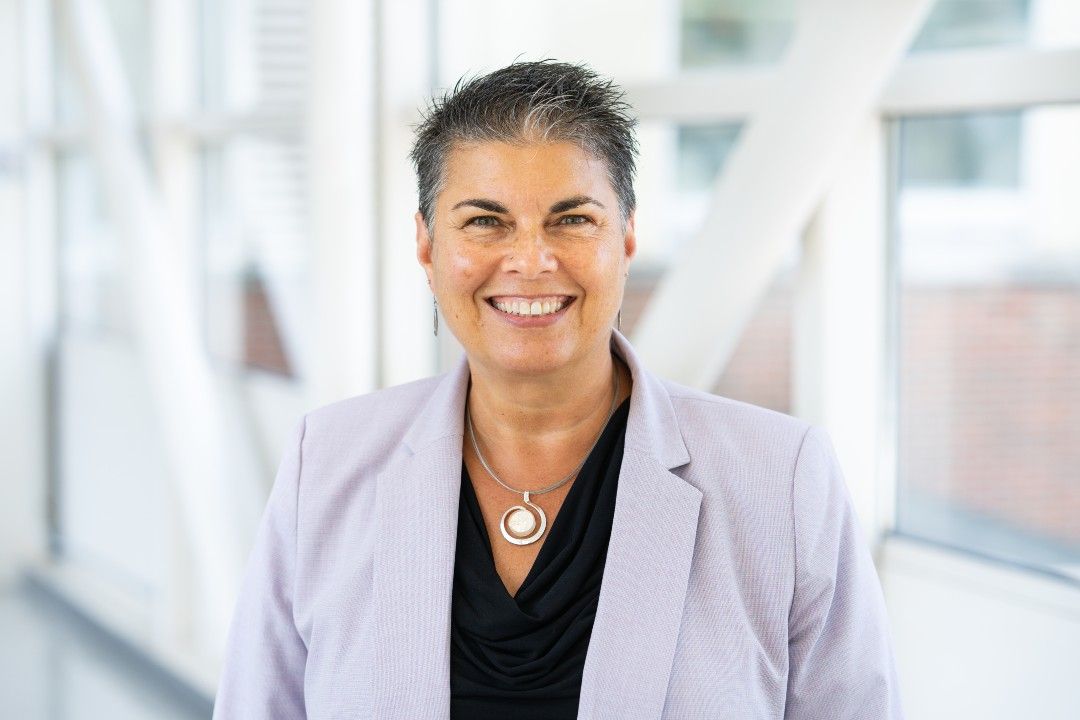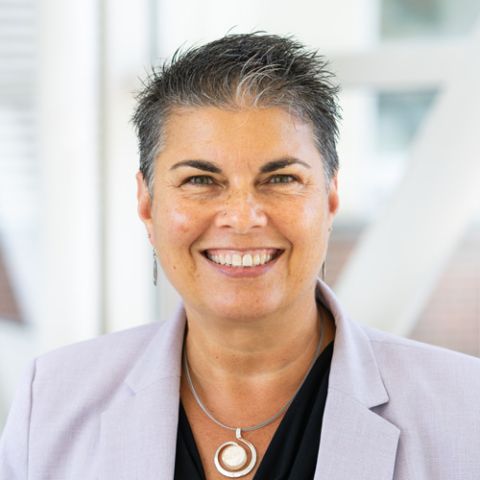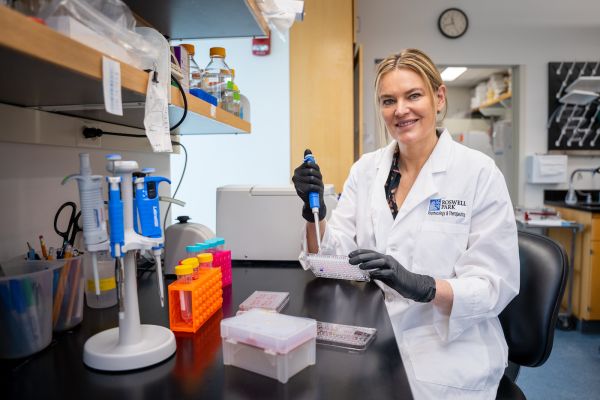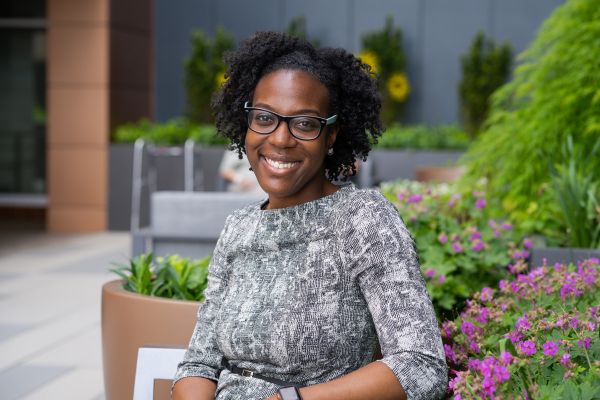Translating career "aha! moments" to clinical informatics for cancer care
Lauren Bruckner, MD, PhD, traveled a savvy and strategic route from laboratory research to clinical practice to administrative leadership to reach her current post as Chief Medical Information Officer at Roswell Park Comprehensive Cancer Center.
"I wanted to become a scientist,” she says, explaining that she spent her earliest childhood in Brooklyn, grew up near the Jersey Shore and was an undergraduate biology major in Baltimore, Maryland, when she decided to pursue a master’s degree in molecular genetics.
She was doing bench research as a graduate student at Columbia University in New York City when she had her first lifework "aha! moment." “We were working on gene therapy for sickle cell disease, and because of that I was interacting with a lot of the hematologists,” Dr. Bruckner recalls. “Those interactions were key because I came to realize that while I loved the science, I thought a better fit for myself was being a doctor and working directly with patients.”
Moving from the laboratory bench to the bedside
She re-calibrated her professional course, took the MCAT, and applied to medical schools. After acceptance in the MD/PhD program at the State University of New York Upstate Medical University in Syracuse, NY, she spent eight years mounting HIV-related research in molecular biology and immunology, with a specialty in pediatrics. She completed her residency in pediatrics at the University of Rochester Medical Center, followed by a fellowship in pediatric hematology and oncology focused on bone marrow transplant and infections in immunocompromised hosts.
But about four years later, as a junior faculty member, she had another career revelation: while she really loved the “thinking” part of research – the theoretical analysis and experimentation – she realized she hated writing.
“I cannot underscore how much I hated writing,” Dr. Bruckner laughs. “What I realized was that, as a researcher, that’s your lifeline! And I thought, this is way too competitive a field to so dislike a key requirement for success. What am I doing?”
Taking a leadership role
While again trying to figure out how to redirect her career course to accommodate that revelation, as often happens in life, another door opened. A colleague recommended her to fill in for him as inpatient medical director for a children’s hospital in Rochester, NY, while he was on sabbatical.
“Who goes to medical school and then says I really want to go into hospital administration?” she quips. “But two things happened there. One, when he came back, they decided he would split his duties, so I got to continue being the inpatient medical director. And two, because in 2008, 2009, we were just undergoing our transition to electronic medical records, I wound up being the clinical informatics person overseeing oncology care, care of children and the patient portal, which got me involved in patient engagement.” Clinical informatics is an emerging science that uses data and information technology to improve health and healthcare delivery. For example, the use of electronic health records (EHR), which allows your physicians to access up-to-date medical records, helps to improve your care by avoiding redundant testing or imaging, unsafe prescription interactions, or gaps in care.
Dr. Bruckner remained in that capacity for another five years before another "aha! moment" led to an appointment as medical director of patient engagement. The pinnacle of that role, she remembers, was organizing a community-wide launch of Open Notes, an initiative that offers patients access to their clinical notes from the physician providing their care.
“I thought, we keep making changes when new features come out or new issues come up rather than having an actual structure for what we want to attain with this whole new field of patient engagement and all the potential that exists. We should be proactive in developing a strategic plan for patient engagement, not just going along passively and reactively.”
By this time, she had shifted away from basic science and focused on what she refers to as “the science of patient engagement." She credits the CEO of the Medical Faculty Group as her key mentor and for encouraging her to pursue leadership capacities. “He challenged me often by being blunt when he thought I was not thinking through my plans thoroughly. He really helped me hone my leadership skills.”
Never miss another Cancer Talk blog!
Sign up to receive our weekly Cancer Talk e-newsletter.
Sign up!Finding her place at Roswell Park
In 2020, Dr. Bruckner became board certified in clinical informatics and, in September 2021, she joined “Team Roswell” as its Chief Medical Information Officer.
“It’s an excellent fit. I’m a practicing oncologist and my passion is patient engagement and clinical informatics,” she says. “So much of clinical informatics is about organizational culture and managing change. What will the future of cancer care look like and what is Roswell Park’s role going to be in that new vision for the future around digital health? These are the questions Roswell Park was just beginning to ask. I wanted to help that discussion and help shape that strategic plan and vision.
"The advent of digital health has opened up whole new ways to engage patients, educate them, understand the barriers for them and engage them more in their healthcare journey," Dr. Bruckner continues. “It’s no longer only about once a person becomes sick. It’s about their whole healthcare journey and how to keep themselves healthy,” she says, crediting Roswell Park’s smoking cessation program for just that.
Digital health encompasses model health apps and software, wearable medical devices, telemedicine, and health information technology (IT) that support and integrate doctors’ clinical decisions and enhance patient engagement from assessment and diagnosis to treatment and recovery and billing.
With just 10% of her time now devoted to the clinical practice of pediatric hematology and oncology – she still sees patients and participates in clinical discussions – Dr. Bruckner views her role as a “translationist” who interprets needs on the clinical side of cancer care to make it real on the technology side.
“I think it’s important that, as CMIO, I understand the ‘pain points’ of clinicians firsthand. I have to use the tools I am implementing, so I’m an end-user as well,” she says. “I think that helps in interacting with and relating to other clinicians and puts me in a good position for understanding the impact it has on clinical practice when I say, ‘let’s make this change.’”
She adds that Roswell Park’s custom-built patient portal provides a lot of flexibility for patient engagement around risk assessment, early detection, preventive self-care and helping healthcare consumers through every facet of the cancer care journey. One challenge, however, is to establish an enterprise-wide prioritization and strategy for optimizing IT-related clinical applications and workflows. To address this need, Dr. Bruckner has established an IT clinical governance committee and a Provider Informatics Leadership Team to align the institutional needs with its available resources and vision for optimizing the future of cancer care.
Over the years of her stellar career, Dr. Bruckner says she has seen a major change, for the better, in the perception and reception and acceptance of women in science and leadership – but feels there is still a way to go.
“Encouraging girls to go into science, and not being the ‘odd girl out’ for liking science, that’s changing, luckily,” she says. “Some of my greatest alliances and successes in leadership have been because I’ve made alliances with other women in leadership and talked about a lot of challenges that exist for us that are not always the same as for some of our colleagues who are men.”



